| Brno, Czechia
| 19-21 October
| https://bit.ly/3qFh55f
European Research and Innovation Days
| Online
| 28-29 September
| https://bit.ly/3eOzsBP
Creation of a public European medicines infrastructure: Purpose and feasibility
|Brussels, Belgium and Online
|28 September
|https://bit.ly/3DABujD
Solutions in Chemistry 2022
|Sveti Martin na Muri, Croatia
|8-11 November
|https://solutionsinchemistry.hkd.hr/
Chemical Research in Flanders – Chemistry Conference for Young Scientists 2022
|Floréal, Belgium
|12-14 October
|https://crf-chemcys.be/
7 MS Food Day
|Firenze, Italy
|05-07 October
|https://bit.ly/3Uj1ZzZ
Calls for funding and awards
EuChemS Awards
- EuChemS Gold Medal
Deadline: 19 December 2022 18:00 CET - EuChemS Lecture Award
Deadline: 19 December 2022 18:00 CET - EuChemS Awards for Service
Deadline: 19 December 2022 18:00 CET - EuChemS Historical Landmarks Award
Deadline: 19 December 2022 18:00 CET
Marie Skłodowska-Curie Actions
- MSCA Doctoral Networks 2022 | Marie Skłodowska-Curie Actions (europa.eu)
Deadline: 15 November 2022
ERC Calls
The following European Research Council (ERC) calls for funding are open:
- ERC Starting grants
Deadline: 25 October 2022 - ERC Synergy Grants
Deadline: 8 November 2022
Horizon Europe Calls
- Improving food systems sustainability and soil health with food processing residues
Deadline: 27 September 2022 - Citizen science for soil health
Deadline: 27 September 2022 - Prevent and eliminate litter, plastics and microplastics: Innovative solutions for waste-free European rivers
Deadline: 27 September 2022 - Monitoring, reporting and verification of soil carbon and greenhouse gases balance
Deadline: 27 September 2022 - Mediterranean sea basin lighthouse – Actions to prevent, minimise and remediate chemical pollution
Deadline: 27 September 2022 - Knowledge Transfer Network
Deadline: 13 October 2022
IUPAC Call
- Distinguished Women in Chemistry or Chemical Engineering Awards
Deadline: 1 November 2022
European Food Safety Authority (EFSA) public consultations
A number of consultations put forward by the European Food Safety Authority (EFSA) are currently open.
- Revised guidance on the risk assessment of plant protection products on bees (Apis mellifera, Bombus spp. and solitary bees)
Deadline: 3 October - List of intended studies for the renewal of the authorisation of Enterococcus faecium DSM 22502 as a feed additive for all animal species
Deadline: 4 October
You can take a look at it all here.
EuChemS is an official accredited stakeholder of the European Food Safety Authority (EFSA).
European Chemicals Agency (ECHA) public consultations
A number of consultations put forward by the European Chemicals Agency (ECHA) are currently open.
- Call for comments and evidence
Deadline: 30 September 2022 - Harmonised classification and labelling consultations
Deadline: 7 October 2022
In addition, a range of Restriction proposals, Testing proposals and Harmonised classification and labelling consultations are also available – we invite you to take a look at them here.
EuChemS is an official accredited stakeholder of the European Chemicals Agency (ECHA).
European Commission Public Consultations and Roadmaps
A number of consultations and roadmaps put forward by the European Commission are currently open:
- Intellectual property – revised framework for compulsory licensing of patents
Public consultation
Deadline: 29 September 2022 - European Chemicals Agency – proposal for a basic regulation
Call for evidence
Deadline: 10 October 2022 - Soil health protecting sustainably managing and restoring EU soils
Public consultation
Deadline: 24 October 2022
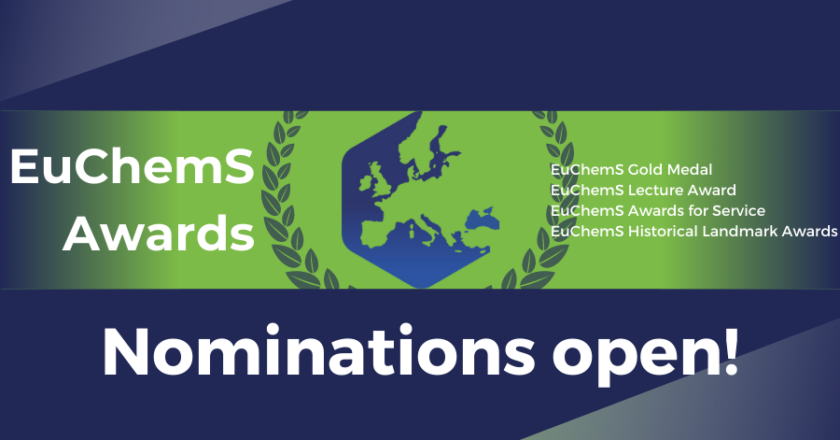
EuChemS Awards nominations opening up
Nominations for the EuChemS Gold Medal, the EuChemS Lecture Award, the EuChemS Awards for Service and the EuChemS Historical Landmark Awards are open.
The EuChemS Gold Medal rewards exceptional achievements of one scientist working in the field of chemistry in Europe every 2 years.
The EuChemS Lecture Award is a honour given every year to a junior scientist working in chemistry in a country with a EuChemS Member Organisation, and
The EuChemS Awards for Service, is looking for nominees who possess an outstanding commitment with regard to fostering chemistry and molecular sciences in Europe, and the goals of EuChemS.
The EuChemS Historical Landmark Award aims to emphasize that Chemistry is an integral part of the Cultural Heritage of Europe.
We are looking forward to receiving all the excellent nominations. You will find the details on our website, as well as in the “calls for funding and awards” section of this newsletter.
All the nominations above are open until 19 December, 18:00 CET.
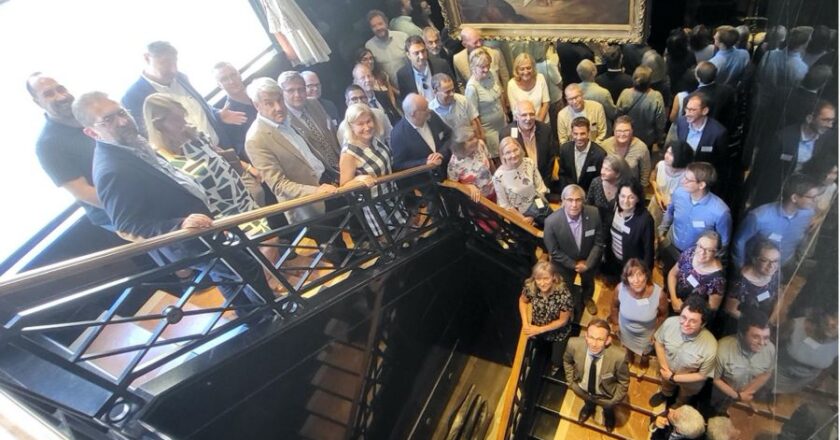
EuChemS meets in Lisbon – annual meetings
Lisbon hosted the General Assembly and Professional Network meetings of EuChemS, that took place on 26 and 27 August.
On the afternoon of 26 August, the key topics were, amongst others, updates on what is new at EuChemS, policy work, projects, communications, financial matters, Professional Networks and EYCN updates. In addition, the new President-Elect, Angela Agostiano and the new Treasurer, Hans Peter Lüthi were elected. EuChemS welcomes them in their new roles, starting in January 2023, Participants thanked for the service of Pilar Goya, current Vice-President and Eckhart Rühl, current Treasurer, whose mandates are approaching their end.
The following day, 27 August, participants discussed a wide range of topics, including, but not limited to awards and strategic issues. The day concluded with the Professional Networks’ annual meeting, which was attended by the representatives of EuChemS professional networks. Representatives introduced their respective PNs, and discussed various topics, and Celine Marmion updated the participants on the status of the ECC9, expected to be held in Dublin, Ireland, in 2024.
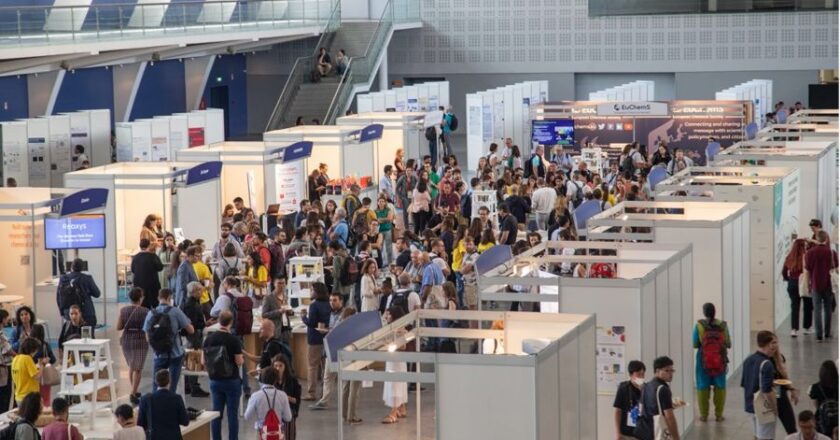
A look back at the successful ECC8
On the afternoon of 1 September, Floris Rutjes, President of the European Chemical Society, and Artur Silva, President of the Portuguese Chemical Society, formally closed the 8th EuChemS Chemistry Congress. We were glad to see that the closing ceremony followed a successful, large scale, international congress – finally in person, after a delay of two years.
Activities related to EuChemS played an important role from the beginning. The European Chemistry Gold Medal Awardees from 2020 and 2022, Michele Parrinello, and Dame Carol Robinson respectively, were receiving their awards at the opening ceremony of the congress, on 28 August. After the ceremony, the exhibition grounds opened, where participants could visit the impressive EuChemS booth to learn more about our activities.
Our booth was visited by high profile, international stakeholders from the chemistry world including, but not limited to representatives of ACS, RSC, GDC, EFMC and IUPAC, with whom we discussed agreements, avenues for future international cooperation and other strategic objectives. Apart from strategic meetings, many visitors were just interested in EuChemS – amongst them, activities such as the demonstration of the EuChemS Periodic Table and the EuChemS Quiz were especially successful.
Apart from our awards and booth, EuChemS also organised two successful sessions. During the Panel Discussion titled Chemists’ contributions to the global approach for tackling pollution, numerous high-profile speakers discussed the science policy implications of the 5th UN Environment Assembly, with a focus on chemistry. In the session Culture and Policy in Science, speakers from social science backgrounds used their unique lenses to examine the scientific process, which led to a lively discussion with the audience.
We were happy to welcome all participants, and we are looking forward meeting you all again at the ECC9, which will be held in Dublin, Ireland, in 2024. Follow us on Twitter, LinkedIn, Facebook and YouTube to stay up to date!
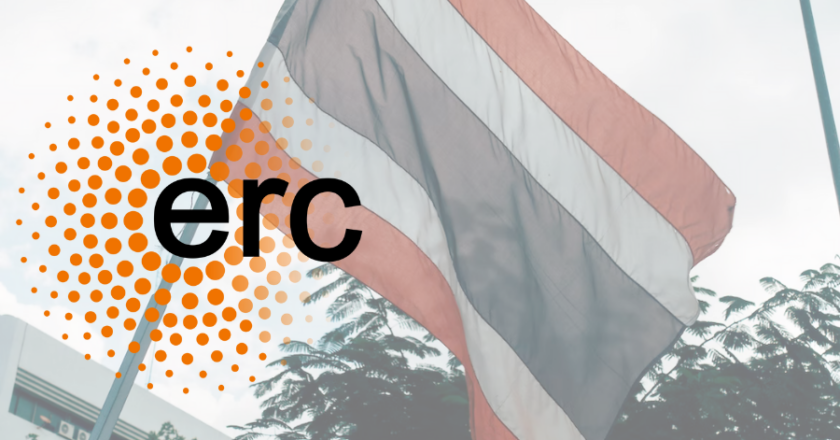
ERC Grantees to collaborate with Thai researchers thanks to new partnership
Thailand and the European Union launched a new initiative on 9 September, aiming to promote cooperation between researchers of the EU and the country. The agreement is pioneering collaboration between the EU and the ASEAN region, as this is the first arrangement that will enable cooperation between Thai researchers and European Research Council (ERC) grantees.
Researchers supported by the Thai Programme Management Unit for Human Resources & Institutional Development, Research and Innovation (PMU-B) of the National Higher Education, Science, Research & Innovation Policy Council will be able to participate in the work of ERC research groups, given mutual interest and/or similarity of research topics. The PMU-B, according to its administrative arrangement, will facilitate coordination as well as their long or short-term research trips.
The initiative was signed in Bangkok by European Union Ambassador to Thailand, David Daly, and the Director of PMU-B Sompong Klaynongsruang. ERC President Maria Leptin attended the ceremony remotely, stating that“We welcome this new agreement that is fully in line with the ERC’s openness to the world.” Prof Leptin’s statement illustrates the ambitions ERC fosters to establish Europe as a global research hub, relying on worldwide outreach. Implementing Arrangements between the council and numerous research organisations in South and North America, Asia and Africa are already in place. The agreement with Thailand is to be an important part of the global outreach strategy.
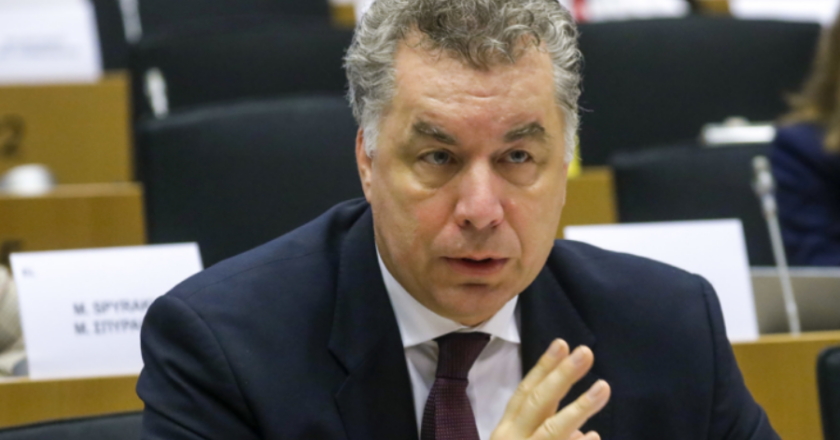
ITRE meets on Innovation Council and REPower EU
Returning from the summer recess, the Committee on Industry, Research and Energy (ITRE) met again on 1 September.
During its first post-recess meeting, the Committee focused on two key topics: the Implementation report on the European Innovation Council (EIC) and the REPowerEU initiative in context of recovery and resilience plans.
Regarding the former, rapporteur Christian Ehler presented a draft, in which he identifies key issues with regards to the European Innovation Council. Firstly, the draft report states that the management of the programme leaves room for improvement, secondly, it highlights that the funding is lacking. In his report, Ehler calls for reimagining the management mode for the EIC alongside reassessing the implementation of the EIC Fund.
Following the demonstration of the draft report of Ehler, Dan Nica presented a draft opinion on the Commission’s proposal to amend the Recovery and Resilience Facility (RRF) Regulation to coordinate it with the REPowerEU initiative. The amendments would modify the RFF regulation in a targeted way to integrate REPower EU chapters in the existing Recovery and Resilience Plans of member states.
The following meeting of the ITRE Committee is expected to be held on 26 September.
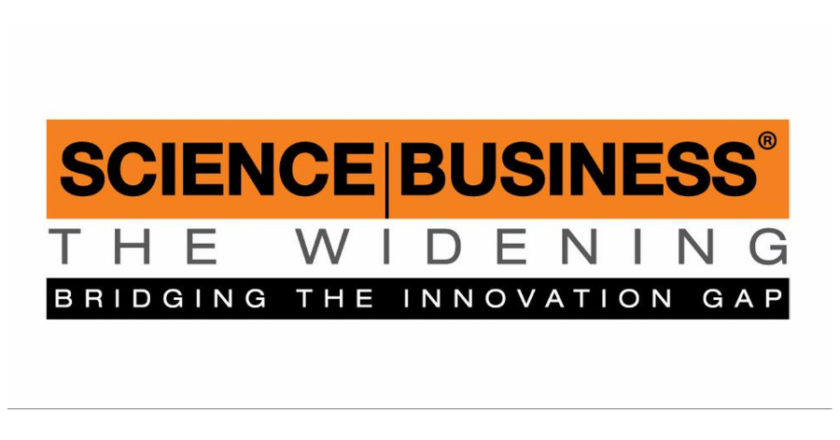
Science/Business initiative to balance innovation between regions
On 7 September, Science/Business, a media organisation and interdisciplinary network of research, policy and industrial organisations, held a public conference in Brussels that aimed at exploring avenues of Research & Industry (R&I) cooperation.
The key focus of the conference was Horizon Europe’s widening agenda and its plans for a European Research Area, both of which aims to even out R&I performance between the eastern and western member states. The event considered the context of the crisis caused by the ongoing Ukraine-Russia war, and its implications on scientific collaboration. A number of high-profile speakers participated from versatile backgrounds covering legislative fields, academia and research as well as industry. Regions within and beyond the borders of Europe were represented: apart from EU countries, speakers from Ukraine and Asia were also present.
Over the course of the event, Science/Business launched its “Widening” initiative. As part of the launch, a Q&A was held with Commissioner for Innovation, Research, Culture, Education and Youth Mariya Gabriel. The “widening” initiative aims to be a tracking tool that surveys the development and growth of the Eastern European region’s public and private R&D enterprises. In the process, it also intends to identify and highlight potential challenges, with the ultimate goal of assisting to bridge Eastern and Western Europe in terms of innovation.

Commission Publishes Environmental Implementation Review
On 8 September, the Commission published the third Environmental Implementation Review (EIR), a regular reporting tool designed to improve the implementation of EU environmental laws and policies. This tool contains defined common trends at EU level and shows information on the state of play in the implementation of EU environmental law, based on 27 individual countries.
The state of play in main environmental policy, according to the Review, shows that the biodiversity continues to decline due to the poor habitat conditions. In addition water management progresses slowly, mostly due to River Basin Management Plans, flood risk management, the implementation of rules for drinking water and urban wastewater management. Finally, the state of Circular economy and air quality also leaves room for improvement.
While overall climate legislation shows a good level of implementation, more intensive efforts, and agreements are needed to implement the package of measures required for meeting the -55% target established in the Climate Law for 2030.
The need for investments across the environmental objectives and priorities are vast and many Member States have to ensure better financing and implementation of enablers. For this, adapting and reinforcing Member States’ administrative capacities to implement the environmental governance is critical.
Since 2017, the EIR works alongside the Commission to support Member States to better apply the EIR agreed rules. Furthermore, the Commission can take legal action if the agreed rules aren’t properly implemented.
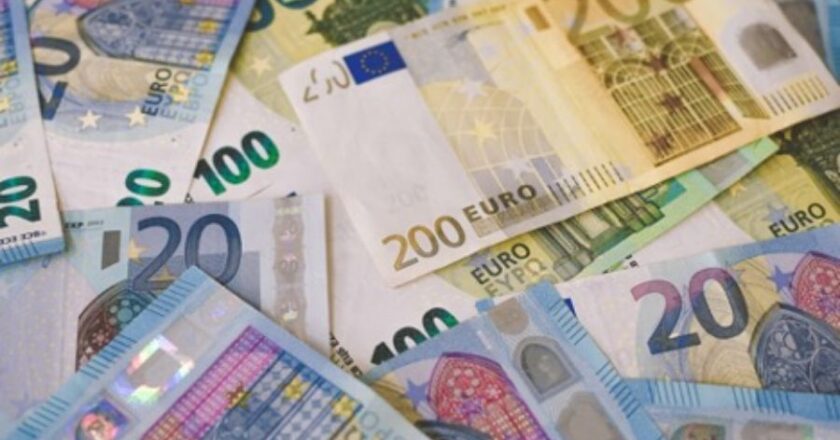
Debates over Horizon Europe budget continue
As the finalisation of the 2023 EU budget approaches, clashes between the European Council and the European Parliament over the funds for the Horizon Europe programme continue.
The Commission’s proposition in June allocated 12.3 Billion EUR to the programme, which was an increase of 100 million EUR compared to the previous year. However, the Heads of States in the European Council amended the proposed budget by reducing it with more than 600 million Euros, which would make the total sum less than the 2022 funding overall. Numerous members of the European Parliament, however, expressed their disapproval towards the proposed cuts.
ITRE Chair Christian Ehler is amongst those who strongly oppose the cuts that would reduce the funding of multiple research and innovation related initiatives, such as the European Research Council and Marie Skłodowska-Curie Actions as well as research infrastructures in general. According to Science/Business, he referred to the budget debate as a “ritual absurdity”, emphasizing the “draconian” nature of the cuts. Alongside Ehler, rapporteur for the 2023 budget, Nicolae Ștefănuță also against the proposed cuts, calling them inappropriate and highlighting that a number of deserving projects already lack funding.
The Parliament foreseeably will settle on a final position on the budget after 10 October, after which it will enter into negotiations with member states. Before this, ITRE will hold a vote on its position on the budget, on 3 October.
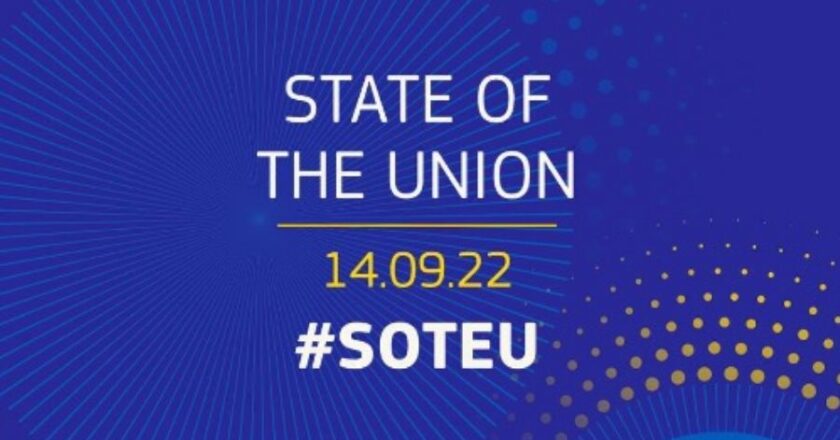
SOTEU address and debate held
On 14 September, President of The European Commission Ursula von der Leyen addressed the members of the European Parliament at the annual, high-profile State of the European Union (SOTEU) debate.
While SOTEU is held every September, following the summer recess, to provide a platform for MEPs to engage with the Commission, evaluate its performance in the past year and its future directions, the 2022 occasion is considered extraordinary by many, as the EU faced significant challenges last year, and it is set to face an equally challenging future.
Indeed, these challenges were the key topics of von der Leyen’s yearly address which, as in very year, contained important announcements that will likely define the following years. The address focused heavily on the Russian-Ukrainian war, the expressions of solidarity towards Ukraine, and the commitment towards democracy in the EU. Related to the conflict, the importance of reducing the energy dependency of the Union was highlighted. Connected to this, von der Leyen emphasized the significance of the energy transition, within the frame of programmes such as REPower EU and the European Green Deal. An important announcement was made related to energy transition: the foundation of the European Hydrogen Bank, a 3 billion Euro investment that aims to ensure the creation of a European hydrogen market. In addition to energy issues, she pointed out the threat of democratic backsliding within the EU but also expressed ambitions towards expanding the union.
Ursula von der Leyen’s entire speech can be read here.

